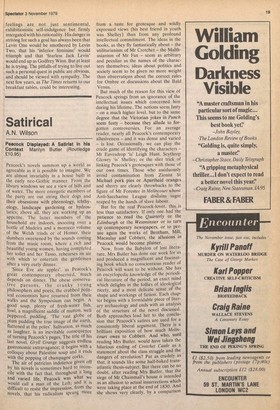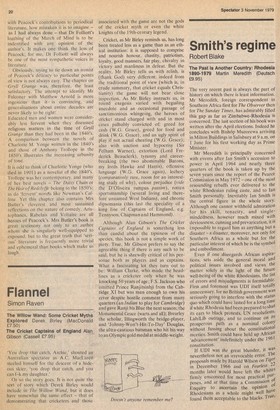Satirical
A.N. Wilson Peacock Displayed: A Satirist in his Context Marilyn Butler (Routledge £10.95) Peacock's novels summon up a world as agreeable as it is possible to imagine. We are almost invariably in a house built in the early neo-Gothic manner. From the library windows we see a view of hills and of water. The more energetic members of the party are out airing their dogs and their obsessions with phrenology, ichthyology, landscape gardening or hydrostatics; above all, they are working up an appetite. The lazier members of 'the household are indoors, snoozing over a bottle of Madeira and a morocco volume of the Welsh triads or of Homer, their Slumbers sweetened by the sounds coming from the music room, where a rich and beautiful young women, having completed her toilet and her Tasso, rehearses an air with which to entertain the gentlemen after a very early dinner. 'Since Eve ate apples', as Peacock's great contemporary observed, much depends on dinner. The obese conservative parsons, the cranky young Philosophers and poets, the crabbed political economists have returned from their walks and the Symposium can begin. A good soup, plenty of fresh-water fish, fowl, a magnificent saddle of mutton, well peppered, pudding. 'The vast globe of plum pudding the true image of the earth, flattened at the poles'. Salivation, as much as laughter, is an inevitable consequence of turning Peacock's pages. The title of his last novel, Cry!! Grange suggests endless gastronomic extravagance; it begins with a i colloquy about Palestine soup and t ends with the popping of champagne corks. The air of patrician indolence given off by his novels is sometimes hard to reconcile with the fact that, throughout a long and varied life, Peacock was what, we would call a man of the Left; and it is difficult to resist the impression, from the novels, that his radicalism sprang more from a taste for grotesque and wildly expressed views (his best friend in youth was Shelley) than from any profound intellectual commitment. The ideas in the books, as they fly fantastically about the utilitarianism of Mr Crotchet the Malth usianism of Mr Fax seem as arbitrary and peculiar as the names of the charac ters themselves; ideas about politics and society seem to be given no more weight than observations about the correct rules for Ombre or discussions about the Bald Venus.
But much of the reason for this view of Peacock springs from an ignorance of the intellectual issues which concerned him during his lifetime. The notions seem fusty on a much higher level, but to the same degree that the Victorian jokes in Punch seem fusty because they allude to forgotten controversies. For an average' reader, nearly all Peacock's contemporary allusiveness and it was dense and varied is lost. Occasionally, we can play the crude game of identifying the characters Mr 'Eavesdrop 'is' Leigh Hunt, Scythrop Glowry 'is' Shelley; or the slier trick of linking Peacock's grotesques with those of our own times. Those who assiduously avoid contamination from Zionist St Michael pork pies or Apartheid oranges and sherry are clearly throwbacks to the figure of Mr Forester in Melincourt whose Anti-Saccharine League disilains sugar reaped by the hands of slave labour.
But for the real Peacock-lover, this is less than satisfactory. If only one had the patience to read the Quarterly or the Edinburgh or the Westminster or to turn up contemporary newspapers, or to peruse again the works of Bentham, Mill, Macaulay and Cobbett, the allusions in Peacock would become plainer.
Now, from the Babylon of lost literature, Mrs Butler has done our work for tp, and produced a magnificent and fascinat-. ing book which no conscientious reader ot Peacock will want to be without. She has an encyclopedic knowledge of the periodical literature of the period, an exact mind which delights in the follies of ideological nicety, and a most delicate sense of the shape and workings of fiction. Each chapter begins with a formidable piece of literary archaeology and ends with an analysis of the structure of the novel discussed. Both approaches lead her to the conclusion that Peacock's satires are used for a consistently liberal argument. There is a brilliant exposition of how much Melin: court owes to Cobbett. And who, until reading Mrs Butler, would have taken the hilarious ending of Crotchet Castle as a statement about the class struggle and the dangers of revolution? Put as crudely as that, it sounds like some half-baked transatlantic thesis-subject. But there can be no doubt, after reading Mrs Butler, that the siege of Mr Chainmail's house is intended as an allusion to actual insurrections which were taking place at the end of 1830. And she shows very clearly, by a comparison with Peacock's contributions to periodical literature, how mistaken it is to imagine — as I had always done — that Dr Folliott's loathing of the March of Mind is to be indentified with any opinion of the author's. It makes one think the less of Peacock; for me, Dr Folliott will always be one of the most sympathetic voices in literature.
Obviously, trying to tie down an ironist of Peacock's delicacy to particular points of view is not always easy. The chapter on Gryll Grange was, therefore, the least satisfactory. The attempt to identify Mr Falconer with Matthew Arnold is more ingenious than it . is convincing, and generalisations about entire decades are never likely to be right: Educated men and women were considerably less fervent when they discussed religious matters in the time of Gryll Grange than they had been in the 1840's, ' A comparison between the novels of Charlotte M. Yonge written in the 1840's and those of Anthony Trollope in the 1850's illustrates the increasing urbanity of tone, It is odd to think of Charlotte Yonge (who died in 1901) as a novelist of the 1840's. Trollope was her contemporary, and many of her best novels — The Daisy Chain or The Heir of Reddyffi, belong to the 1850's; as do 'fervent' novels like Newman's Callista. Yet this chapter also contains Mrs Butler's cleverest and most sustained reflections on the nature of comedy. A ristophanes. Rabelais and Voltaire are all heroes of Peacock's. Mrs Butler's book is great testimony not only to an author whom she is singularly well-equipped to expound. but to the great truth that 'serious' literature is frequently more trivial and ephemeral than books which make us. laugh.



































 Previous page
Previous page